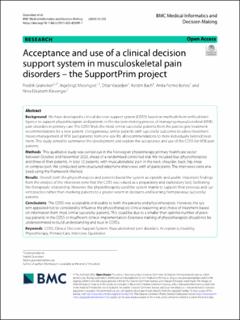| dc.contributor.author | Granviken, Fredrik | |
| dc.contributor.author | Meisingset, Ingebrigt | |
| dc.contributor.author | Vasseljen, Ottar | |
| dc.contributor.author | Bach, Kerstin | |
| dc.contributor.author | Bones, Anita Formo | |
| dc.contributor.author | Klevanger, Nina Elisabeth | |
| dc.date.accessioned | 2024-02-20T09:35:31Z | |
| dc.date.available | 2024-02-20T09:35:31Z | |
| dc.date.created | 2024-01-02T09:34:44Z | |
| dc.date.issued | 2023 | |
| dc.identifier.citation | BMC Med Inform Decis Mak 23, 293 (2023) | en_US |
| dc.identifier.issn | 1472-6947 | |
| dc.identifier.uri | https://hdl.handle.net/11250/3118603 | |
| dc.description.abstract | Background
We have developed a clinical decision support system (CDSS) based on methods from artificial intelligence to support physiotherapists and patients in the decision-making process of managing musculoskeletal (MSK) pain disorders in primary care. The CDSS finds the most similar successful patients from the past to give treatment recommendations for a new patient. Using previous similar patients with successful outcomes to advise treatment moves management of MSK pain patients from one-size fits all recommendations to more individually tailored treatment. This study aimed to summarise the development and explore the acceptance and use of the CDSS for MSK pain patients.
Methods
This qualitative study was carried out in the Norwegian physiotherapy primary healthcare sector between October and November 2020, ahead of a randomised controlled trial. We included four physiotherapists and three of their patients, in total 12 patients, with musculoskeletal pain in the neck, shoulder, back, hip, knee or complex pain. We conducted semi-structured telephone interviews with all participants. The interviews were analysed using the Framework Method.
Results
Overall, both the physiotherapists and patients found the system acceptable and usable. Important findings from the analysis of the interviews were that the CDSS was valued as a preparatory and exploratory tool, facilitating the therapeutic relationship. However, the physiotherapists used the system mainly to support their previous and current practice rather than involving patients to a greater extent in decisions and learning from previous successful patients.
Conclusions
The CDSS was acceptable and usable to both the patients and physiotherapists. However, the system appeared not to considerably influence the physiotherapists' clinical reasoning and choice of treatment based on information from most similar successful patients. This could be due to a smaller than optimal number of previous patients in the CDSS or insufficient clinical implementation. Extensive training of physiotherapists should not be underestimated to build understanding and trust in CDSSs. | en_US |
| dc.language.iso | eng | en_US |
| dc.publisher | BMC | en_US |
| dc.rights | Navngivelse 4.0 Internasjonal | * |
| dc.rights.uri | http://creativecommons.org/licenses/by/4.0/deed.no | * |
| dc.title | Acceptance and use of a clinical decision support system in musculoskeletal pain disorders – the SupportPrim project | en_US |
| dc.title.alternative | Acceptance and use of a clinical decision support system in musculoskeletal pain disorders – the SupportPrim project | en_US |
| dc.type | Journal article | en_US |
| dc.type | Peer reviewed | en_US |
| dc.description.version | publishedVersion | en_US |
| dc.source.volume | 23 | en_US |
| dc.source.journal | BMC Medical Informatics and Decision Making | en_US |
| dc.source.issue | 1 | en_US |
| dc.identifier.doi | 10.1186/s12911-023-02399-7 | |
| dc.identifier.cristin | 2218611 | |
| cristin.ispublished | true | |
| cristin.fulltext | original | |
| cristin.qualitycode | 1 | |

